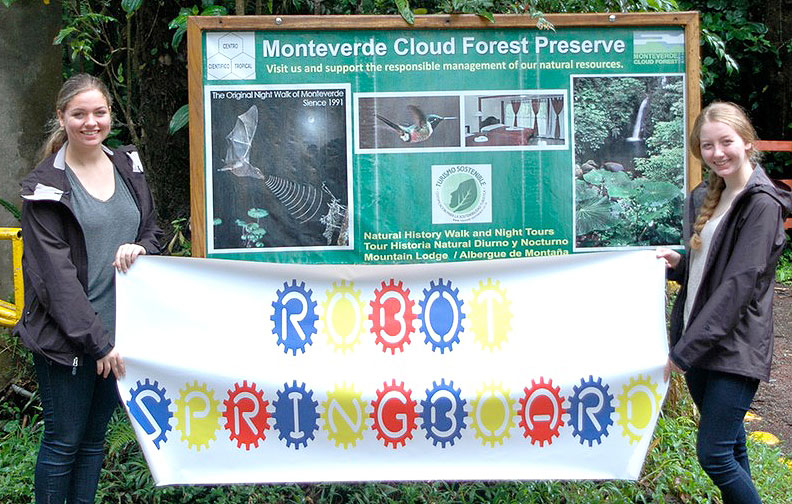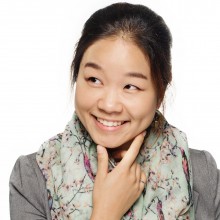
Robohub.org
167
Engaging Girls in Robotics with Hannah and Rachael Tipperman, Ross Mead and Elizabeth Croft


Earlier this year, the Robots Podcast team came across a story about two 17 year old twin sisters who started their own robotics outreach group. The story about the Tipperman sisters got us curious. What kind of robotics outreach activities are out there to inspire children? Do any of these activities make a difference in getting more girls interested in robotics?
In this episode, AJung Moon conducted a series of three interviews. She spoke to the Tipperman sisters to find out more about their activities, and with Ross Mead, a PhD student who has years of experience organizing robotics events and inspiring young minds. She then talks with Professor Elizabeth Croft, a roboticist who also studies the topic of women in science, technology, engineering and math (STEM).
Hannah and Rachael Tipperman
 Hannah and Rachael Tipperman are high school seniors. They became interested in robotics almost “accidentally” when Hannah participated in a one-time robotics workshop for middle school girls. Since then, they have participated in the FIRST Lego League, FIRST Tech Challenge, FIRST Robotics Challenge, and they founded and captain their school’s Vex Robotics Team. They developed Robot Springboard in the summer between 9th and 10th grade as a way of “paying it forward” and helping other children and communities learn more about, and become involved in, robotics. They run week-long programs in robotics and computing for communities as diverse as Homer, Alaska and Monteverde, Costa Rica. They have also run a week-long “Robot Springboard Technology Camp @ Drexel University” for middle school girls with the help and support of the National Center for Women and Information Technology and Drexel University.
Hannah and Rachael Tipperman are high school seniors. They became interested in robotics almost “accidentally” when Hannah participated in a one-time robotics workshop for middle school girls. Since then, they have participated in the FIRST Lego League, FIRST Tech Challenge, FIRST Robotics Challenge, and they founded and captain their school’s Vex Robotics Team. They developed Robot Springboard in the summer between 9th and 10th grade as a way of “paying it forward” and helping other children and communities learn more about, and become involved in, robotics. They run week-long programs in robotics and computing for communities as diverse as Homer, Alaska and Monteverde, Costa Rica. They have also run a week-long “Robot Springboard Technology Camp @ Drexel University” for middle school girls with the help and support of the National Center for Women and Information Technology and Drexel University.
This past year, they launched BrightStart Robotics, a program tailored to younger children (kindergarten through 3rd grade) and their parents. The BrightStart program has been remarkably successful and has hosted over 100 parents and 100 children in the past year. They are presently training other high school students to help run these programs. Hannah and Rachael Tipperman plan to pursue studies in Computer Science in college.
Ross Mead
 Ross Mead is a Computer Science PhD student, former NSF Graduate Research Fellow, and former fellow of the USC Body Engineering Los Angeles program (part of the NSF GK-12 initiative). His research focuses on the principled design and modeling of fundamental social behaviors (such as social spacing, eye gaze, gesturing, turn-taking, and other nonverbal social cues) that serve as building blocks to facilitate natural face-to-face human-robot interactions. For over a decade, Ross has been involved with robotics outreach programs, such as Botball and FIRST, serving as an international program instructor, regional coordinator, competition designer, event host, technical mentor, and seasoned competitor. His Master Thesis was designed and implemented using hardware and software platforms used in these outreach programs, demonstrating the applicability of inexpensive and accessible technologies in real-world scenarios. Over the years, Ross has worked directly with thousands of K-12 and higher-education students, in an effort to improve the understanding of STEM principles and promote the pursuit of STEM studies and careers. Ross is the first to have formally introduced sociable robotics into the standard K-12 curriculum; this distinguishes itself from traditional robotics activities, which tend to focus on tasks that are “dirty, dangerous, and dull” for a human to perform. His goal is to use sociable robotics topics to increase interest and self-efficacy of K-12 students underrepresented in STEM, such as females, African-Americans, Latinos/Latinas, and Native Americans.
Ross Mead is a Computer Science PhD student, former NSF Graduate Research Fellow, and former fellow of the USC Body Engineering Los Angeles program (part of the NSF GK-12 initiative). His research focuses on the principled design and modeling of fundamental social behaviors (such as social spacing, eye gaze, gesturing, turn-taking, and other nonverbal social cues) that serve as building blocks to facilitate natural face-to-face human-robot interactions. For over a decade, Ross has been involved with robotics outreach programs, such as Botball and FIRST, serving as an international program instructor, regional coordinator, competition designer, event host, technical mentor, and seasoned competitor. His Master Thesis was designed and implemented using hardware and software platforms used in these outreach programs, demonstrating the applicability of inexpensive and accessible technologies in real-world scenarios. Over the years, Ross has worked directly with thousands of K-12 and higher-education students, in an effort to improve the understanding of STEM principles and promote the pursuit of STEM studies and careers. Ross is the first to have formally introduced sociable robotics into the standard K-12 curriculum; this distinguishes itself from traditional robotics activities, which tend to focus on tasks that are “dirty, dangerous, and dull” for a human to perform. His goal is to use sociable robotics topics to increase interest and self-efficacy of K-12 students underrepresented in STEM, such as females, African-Americans, Latinos/Latinas, and Native Americans.
Elizabeth Croft

Elizabeth A. Croft is a Professor of Mechanical Engineering and Associate Dean, Education and Professional Development for the Faculty of Applied Science at the University of British Columbia (UBC). She holds the NSERC Chair for Women in Science and Engineering, BC/Yukon at UBC and leads the Westcoast Women in Engineering, Science, and Technology (WWEST) program.
Elizabeth founded WWEST in order to attract, recruit, and retain women in engineering and science careers. WWEST works at national, regional, and local levels with organizations engaged in increasing the number of women in science, engineering, and technology (SET) disciplines through multilateral partnerships spanning community, academic, and private sector partners. Elizabeth frequently gives talks and runs educational sessions to promote women in engineering from elementary school through graduate studies, academe and industry careers. She has received numerous awards for her activities promoting women in engineering.
She is also the director of the Collaborative Advanced Robotics and Intelligent Systems Laboratory at UBC. Her research investigates how robotic systems interact with people, and be perceived to behave, in a safe, predictable, and helpful manner.
Links:
- Download mp3 (21.8MB)
- Subscribe to Robots using iTunes
- Subscribe to Robots using RSS
- Robot Springboard
- Ross Mead
- Elizabeth Croft
tags: c-Education-DIY, cx-Politics-Law-Society, women in robotics, women in STEM





